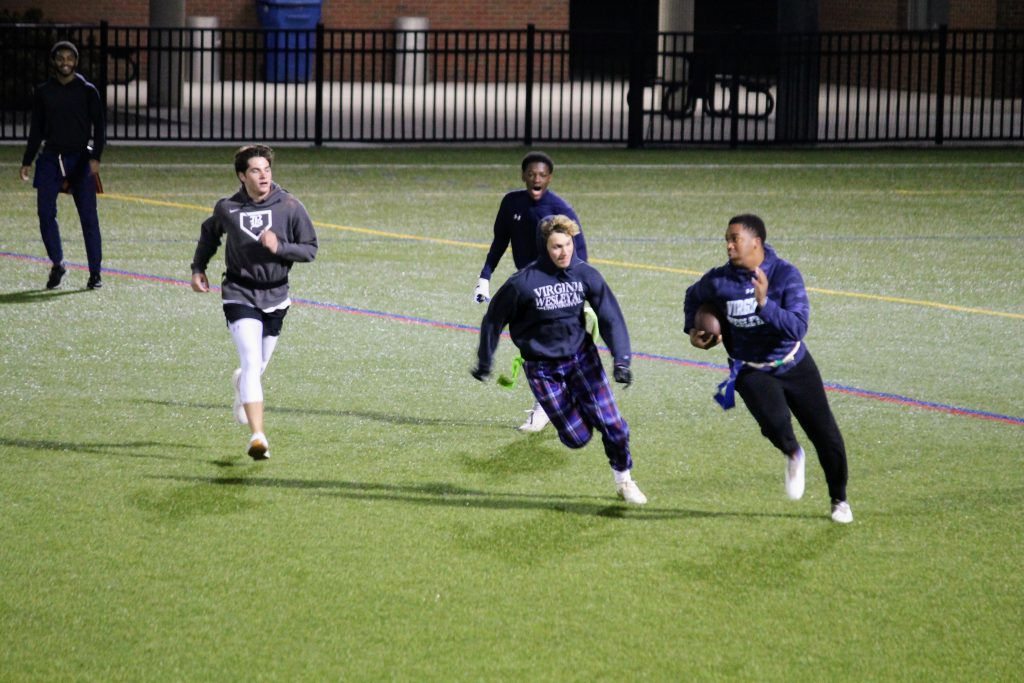This past academic year has been one of the most challenging years for students, faculty, staff and society as a whole due to the COVID-19 pandemic. VWU was able to maintain on-campus services for the duration of fall 2020 and spring 2021 semesters after students were sent home in March 2020.
This was due to the efforts of the creation of the COVID-19 Health and Wellbeing Commitment that outlined campus policies regarding pre-arrival health monitoring, testing and contact tracing, physical distancing, general hygiene, face coverings, gathering size limits and isolation and quarantine.
The total number of VWU cases were 33 for the fall and 54 for this spring as of April 16. As far as the breakdown of courses offered, Associate Vice President for Campus Life and Operational Management Jason Seward stated that a total of 400 courses were offered this semester and 70 were taught in remote format. The current hope is that the Fall 2021 semester will offer fully in-person instruction and a more normal campus atmosphere, but that is dependent on several factors.
In an interview with the Chronicle, President Scott D. Miller was pleased with VWU’s response to the pandemic since our number of positive tests were among the lowest of the private colleges that offered in-person instruction, but acknowledged the challenges this year has presented students. He also understands that the rules have been extra strict but it is because he wants everybody to remain healthy and safe.
“Reflecting on the year, the thing that I hate for freshmen coming in is that it was the most abnormal year that you would find out here on any college campus in the United States, and you hate that. What we hope is that we’ll get over this and that the next three years will be the best years of their life,” Miller said.
He is routinely in contact with the Council of Independent Colleges in Virginia as well as the State Council for Higher Education in Virginia which have brought together the 61 private and public institutions to discuss difficulties and learn from each other. “I’m extremely complimentary of our state coordinating bodies, who have done an excellent job of sharing, of having a think tank. Whether it’s the large institutions or the small institutions, the public or the private, they’re all together sort of sharing goodwill and working together in a spirit of cooperation that you don’t see very frequently among competitors,” Miller said.
He also complimented the faculty, staff and students for responding well to the COVID-19 guidelines and following the rules being concerned about the health and well being of others.
Regarding the vaccination process, the administration wants as many people as possible to get the vaccine. They have not yet made a decision on whether to make it mandatory. “We are not making a position statement right now on a requirement of vaccination. And that comes really from our meetings, statewide, where the state has said to us, ‘because right now the vaccine is an emergency vaccine, there are additional steps that you have to go through before you can require it.’ So, while we do require vaccines for a number of other things to be a student here, we’re taking the state’s advice right now, and rather than being the first to make an announcement, we’re going to make the right announcement at the right time,” Miller said.
Sophomore Jaron Berry appreciated that several of his classes were in-person as well as the hybrid format. “Despite the challenges of this year, I think we are all doing the best we can,” Berry said. “No matter the format of the class, we are all here to get an education, and I feel like we should be proud of making it through fully on campus. A lot of other schools can’t say the same.”
Freshman Abby Mahoney concurred with Berry in complimenting the flex format for courses that allowed a portion of the class to be in-person with the professor and the other half online on some days while the other portion would attend in-person on another day. “I liked the fact that we were able to make compromises as a campus to stay safe. I think as a small school we have the ability to do a lot of things that larger schools can’t, such as have flex 50 courses. There is always room for improvement though,” Mahoney said.
Freshman Morgan Ludovici felt that she missed out on a significant portion of her college experience and hopes the fall will be better. “The silver lining is that we were able to contain COVID cases on campus and continued to play sports throughout the spring semester,” Ludovici said. “As a student-athlete, playing my sport has been my main outlet. I really hope that in the fall we gain a little more normalcy and we continue to move in the right direction.”
Looking towards the fall semester, Miller wants students to have an “enjoyable, participative college career,” but believes we will still be a masked campus with social distancing guidelines. The semester may be more enjoyable depending on the trend of cases and vaccinate rates. Also, a major influence on that decision making process is the restrictions that the state government implements.
His hope is that most classes will be in person because many people come to VWU for personal interactions. “We want those personal interactions and as long as those interactions can be provided safely it’s our intent to do [that],” Miller stated.
By Connor Merk & Katie Yeager
ccmerk@vwu.edu kayeager@vwu.edu

